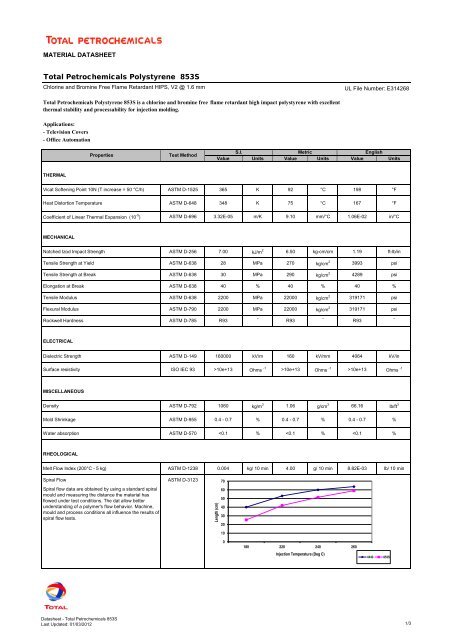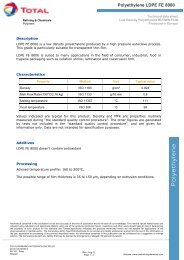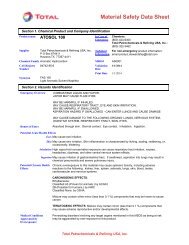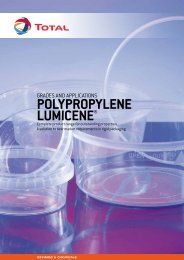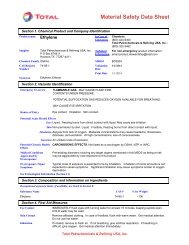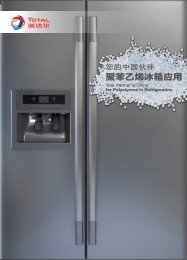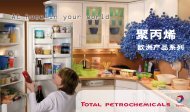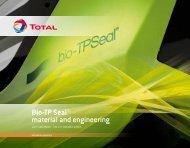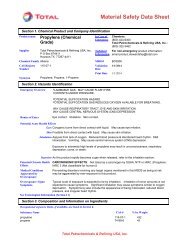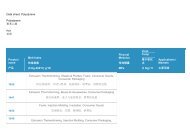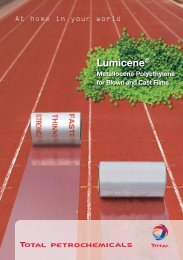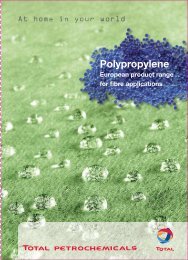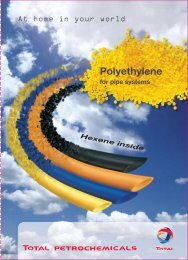Technical Data Sheet - Total Petrochemicals
Technical Data Sheet - Total Petrochemicals
Technical Data Sheet - Total Petrochemicals
Create successful ePaper yourself
Turn your PDF publications into a flip-book with our unique Google optimized e-Paper software.
MATERIAL DATASHEET<br />
<strong>Total</strong> <strong>Petrochemicals</strong> Polystyrene 853S<br />
Chlorine and Bromine Free Flame Retardant HIPS, V2 @ 1.6 mm UL File Number: E314268<br />
<strong>Total</strong> <strong>Petrochemicals</strong> Polystyrene 853S is a chlorine and bromine free flame retardant high impact polystyrene with excellent<br />
thermal stability and processability for injection molding.<br />
Applications:<br />
- Television Covers<br />
- Office Automation<br />
THERMAL<br />
MECHANICAL<br />
ELECTRICAL<br />
MISCELLANEOUS<br />
RHEOLOGICAL<br />
Properties<br />
<strong>Data</strong>sheet - <strong>Total</strong> <strong>Petrochemicals</strong> 853S<br />
Last Updated: 01/03/2012<br />
Test Method<br />
ASTM D-696 3.32E-05<br />
S.I.<br />
Metric<br />
English<br />
Value Units Value Units Value Units<br />
Vicat Softening Point 10N (T increase = 50 °C/h) ASTM D-1525 365<br />
K<br />
92<br />
°C<br />
198<br />
Heat Distortion Temperature<br />
Coefficient of Linear Thermal Expansion (10 -5 )<br />
Notched Izod Impact Strength<br />
Tensile Strength at Yield<br />
Tensile Strength at Break<br />
Elongation at Break<br />
Tensile Modulus<br />
Flexural Modulus<br />
Rockwell Hardness<br />
Dielectric Strength<br />
Surface resistivity<br />
Density<br />
Mold Shrinkage<br />
Water absorption<br />
Melt Flow Index (200°C - 5 kg)<br />
Spiral Flow<br />
Spiral flow data are obtained by using a standard spiral<br />
mould and measuring the distance the material has<br />
flowed under test conditions. The dat allow better<br />
understanding of a polymer's flow behavior. Machine,<br />
mould and process conditions all influence the results of<br />
spiral flow tests.<br />
ASTM D-648<br />
ASTM D-256<br />
ASTM D-638<br />
ASTM D-638<br />
ASTM D-638<br />
ASTM D-149<br />
ASTM D-792<br />
ASTM D-955<br />
ASTM D-570<br />
ASTM D-1238<br />
348<br />
7.00<br />
28<br />
30<br />
2200<br />
2200<br />
R93<br />
160000<br />
ISO IEC 93 >10e+13<br />
ASTM D-3123<br />
1060<br />
0.4 - 0.7<br />
0.004<br />
K<br />
m/K<br />
MPa<br />
MPa<br />
10e+13<br />
1.06<br />
0.4 - 0.7<br />
RECOMMENDED INJECTION MOLDING PARAMETERS<br />
Barrel Temperature<br />
Maximum melt temperature is 300 °C<br />
Never leave material in moulding machine at working temperature for longer than 30 minutes<br />
, either reduce melt by 150 C or purge into Natural PS or purging agent<br />
Ensure all fumes are extracted at source and all ducting examined for build up.<br />
Clean where appropriate. Any build up could promote fire hazard.<br />
General Information :<br />
Zone 1<br />
Zone 2<br />
Zone 3<br />
Zone 4<br />
Nozzle<br />
Standard Properties: All Tests are carried out at 23 °C unless otherwise stated. Mechanical properties are measured on injection moulded test specimens<br />
Bulk Density: Bulk Density of all Natural grades is approximately 0.6 g/cm3<br />
<strong>Total</strong> <strong>Petrochemicals</strong> Polystyrene 853S should be kept in a cool and dry place. Avoid direct exposure to sunlight.<br />
<strong>Total</strong> <strong>Petrochemicals</strong><br />
<strong>Total</strong> <strong>Petrochemicals</strong> SEA Pte Ltd<br />
53 Tuas Crescent,<br />
Singapore (638732)<br />
Tel: +65 686 21 228<br />
Fax: +65 686 90 345<br />
<strong>Data</strong>sheet - <strong>Total</strong> <strong>Petrochemicals</strong> 853S<br />
Last Updated: 01/03/2012<br />
Value Units<br />
Mold Temperature Value<br />
Units<br />
190 - 210 °C Fixed Half<br />
40 - 50<br />
°C<br />
210 - 230<br />
°C Moving Half<br />
10 -- 30<br />
°C<br />
220 - 250<br />
°C Injection Pressure<br />
200 - 400<br />
Bars<br />
250 - 260<br />
°C Hold on Pressure<br />
20 - 80<br />
Bars<br />
250 - 280<br />
°C Screw Back Pressure<br />
10 - 50<br />
Bars<br />
Screw Speed<br />
Pre Drying Temperature for 2<br />
hours<br />
Information contained in this publication is true and accurate at the time of publication and to the best of our knowledge. The nominal values stated herein are obtained using laboratory test specimens. Before<br />
using one of the products mentioned herein, customers and other users should take all care in determining the suitability of such product for the intended use. Unless specifically indicated, the products<br />
mentioned herein are not suitable for applications in the pharmaceutical or medical sector. The companies within TOTAL PETROCHEMICALS do not accept any liability whatsoever arising from the use of this<br />
information or the use, application or processing of any product described herein. No information contained in this publication can be considered as a suggestion to infringe patents. The companies disclaim any<br />
liability that may be claimed for infringement or alleged infringement of patents.<br />
50 - 200<br />
70<br />
RPM<br />
°C<br />
2/3
Safety and Material Handling<br />
TOTAL PETROCHEMICALS offers a comprehensive<br />
range of TOTAL PETROCHEMICALS<br />
POLYSTYRENE (PS) specially formulated to suit<br />
different needs. This extensive line includes impact<br />
polymers, either natural or with additives, with equally<br />
wide-ranging properties to fulfill all customer<br />
expectations in terms of fire resistance, appearance,<br />
cost and processing. Its tremendous ease of<br />
processing and its low cost make it one of the most<br />
commonly used polymers in the food packaging,<br />
audio/video, household appliances and construction<br />
industries.<br />
TOTAL PETROCHEMICALS Is committed to<br />
providing information to assist our customers in<br />
reducing the risks of handling and using our products.<br />
This bulletin sheet is intended to be a quick reference<br />
guide for TOTAL PETROCHEMICALS customers to<br />
store, handle and use our products safety and in an<br />
environmentally sound manner. We aim to minimize<br />
the impact on mankind and the environment during<br />
production, storage, transportation, sale, use and<br />
disposal of our products.<br />
Safety <strong>Data</strong> <strong>Sheet</strong>s are updated regularly, to reflect<br />
changes and updates on information in an SDS.<br />
Before handling or using any product, please request<br />
and assess the most current Safety <strong>Data</strong> <strong>Sheet</strong>s. The<br />
information provided below is appropriate only to<br />
TOTAL PETROCHEMICALS ’s products as delivered.<br />
In the course of fabrication, many additives and<br />
ingredients may be added before the finished product.<br />
These must be explored thoroughly for their<br />
respectively health and safety considerations.<br />
Product Stewardship Program<br />
The aim of the product stewardship code of the<br />
responsible care initiative, which makes health, safety<br />
and environmental protection an integral part of<br />
designing, manufacturing, marketing, distributing,<br />
using, recycling and disposing our products.<br />
Successful implementation of these initiatives is a<br />
shared responsibility that includes all who come into<br />
contact with a product. TOTAL PETROCHEMICALS<br />
will work with customers to help ensure that all who<br />
use and handle our products follow safe and<br />
environmentally sound practices.<br />
General Safe Handling Information<br />
TOTAL PETROCHEMICALS POLYSTYRENE are<br />
relatively inert and have a very low degree of toxicity<br />
under normal conditions of use. TOTAL<br />
PETROCHEMICALS POLYSTYRENE should be kept<br />
in cool and dry place. Avoid direct exposure to<br />
sunlight. Keep at room temperature. Nevertheless,<br />
safety and health<br />
<strong>Data</strong>sheet - <strong>Total</strong> <strong>Petrochemicals</strong> 853S<br />
Last Updated: 01/03/2012<br />
precautions should be observed in the handling and<br />
fabrication of plastic materials.<br />
Noise is a common problem in the molding and<br />
compounding process. If possible, no worker should<br />
be exposed to excessive noise (Leq8hours 85dBA).<br />
Proper hearing protectors should be provided for<br />
workers, coupled with regular audiometric<br />
examinations.<br />
Air borne dusts often result from sawing, filing, and<br />
sanding of plastic parts in post-moulding operations.<br />
These may cause irritation to eyes and the upper<br />
respiratory tract. Processing may also release fumes,<br />
which may contain irritating decomposition products.<br />
Adequate exhaust ventilation is recommended. Good<br />
housekeeping and controlling of dusts are necessary<br />
for safe handling of product. Workers should use<br />
approved respirators. If vapours cause irritation to<br />
eyes, a full-face respirator is recommended. Avoid<br />
accumulation of static charges during transfers in<br />
metallic systems.<br />
Workers should be protected from the possibility of<br />
contact with molten PS during fabrication. Molten<br />
material may causes burns. Wash affected areas<br />
abundantly and thoroughly with water. In case of<br />
adhesion, do not try to remove product. Treat the<br />
affected areas as burns.<br />
Proper manual handling practices should be observed<br />
in the lifting and transportation of PS packages.<br />
Occurrences in back and arm injuries are common in<br />
erroneous lifting techniques.<br />
Flammability and Combustibility<br />
Thermal decomposition at 200oC gives off flammable<br />
and harmful products such as styrene, ketones,<br />
toluenes and alcohol. There would be formation of<br />
toxic products, such as carbon oxides through<br />
combustion.<br />
In fighting fire, wear a self-contained breathing<br />
apparatus and protective suit. Water or water fog are<br />
the preferred extinguishing media. Foam, alcohol<br />
resistant foam, carbon dioxide, or dry chemicals may<br />
also be used.<br />
Safe Disposal<br />
Disposal methods must be in compliance with<br />
international, national and local laws and regulations.<br />
Destroy the product by incineration at an approved<br />
waste disposal site.<br />
However, Polystyrene offers many possibilities for<br />
post consumer recycling such as: (1) Energy<br />
recycling using heat recovery systems for urban and<br />
industrial heating systems, (2) Material recycling.<br />
Polystyrene should be recycled whenever possible.<br />
Because of their high energy content, plastics can<br />
help the entire waste mix burn hotter and more<br />
completely in a waste-to-energy incinerator.<br />
Care for the Environment<br />
PS must not be discarded indiscriminately into the<br />
waterways nor land.<br />
Heavy metals is not used in the manufacture of<br />
TOTAL PETROCHEMICALS POLYSTYRENE. As<br />
such, disposal of HIPS via convention methods would<br />
be safe for the environment. Incineration of HIPS<br />
would not emit heavy metals or deleterious dioxins<br />
into the environment. There would be no leaching of<br />
heavy metals into the earth when the incineration ash<br />
is land filled.<br />
Customer Notice<br />
TOTAL PETROCHEMICALS stresses the importance<br />
of health and environmental protection during the<br />
entire lifetime of all TOTAL PETROCHEMICALS<br />
products, and calls for TOTAL PETROCHEMICALS<br />
to cooperate closely with its customers and partners.<br />
To help ensure that TOTAL PETROCHEMICALS ’s<br />
products are not used improperly, TOTAL<br />
PETROCHEMICALS ’s personnel will assist<br />
customers in dealing with product safety, health and<br />
environmental considerations.<br />
This information is provided for GENERAL INFORMATION ONLY. TOTAL PETROCHEMICALS and its affiliates provide a Safety <strong>Data</strong> <strong>Sheet</strong> (SDS) for this product, in<br />
the appropriate language, according to applicable laws and regulations. Copies in your language can be obtained free of charge from your TOTAL PETROCHEMICALS<br />
representative.<br />
Anyone using this product should carefully review the SDS, as well as any other applicable precautions and instructions for use. No liability whatsoever can be accepted<br />
by TOTAL PETROCHEMICALS and its affiliates with regard to the handling, processing or use of the product or products concerned which must in all cases be used in<br />
accordance with all applicable laws and regulations.<br />
The information contained in this document is based on trials carried out by our Research Centers and data selected from the literature. To the best of our knowledge<br />
and at the time of publication, this information is true and accurate. It shall, however, in no event be held to constitute or imply any warranty, undertaking express or<br />
implied commitment from our part. TOTAL PETROCHEMICALS and its affiliates disclaim any liability that may be claimed for infringement or alleged infringement of<br />
patents."<br />
3/3


